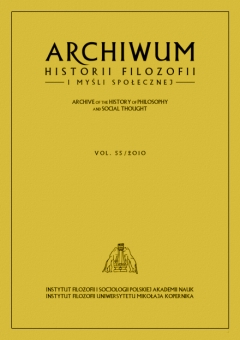Libertynizm filozoficzny Casanovy
Casanova’s philosophical libertinism
Author(s): Marian SkrzypekSubject(s): Philosophy
Published by: Instytut Filozofii i Socjologii Polskiej Akademii Nauk
Keywords: Casanova; libertinism; Epicureanism; hedonism;
Summary/Abstract: Till very recently Casanova was arousing interest chiefly because of his love affairs described in History of My Life (published as Mémoires). A new research into Casanova is focused on his historical, erudite and philosophical works (Istoria delle turbolenze della Polonia, Lana caprina, Della filosofia e dei i losoi, Icosameron). This text is devoted to Casanova as a representative of an erudite libertinism. A philosophical background for his libertinism can be found in Epicureanism, related to the 10th Book in Diogenes Laertios, to Lucretius, Gassendi, Newton, Batteux, La Mettrie, Voltaire and the clandestine libertine literature that connects materialist, deistic and atheist tendencies with immorality and pornography. A characteristic feature of Casanova’s libertinism is a readiness to compromise, pragmatism and opportunism. In ontology Casanova departs from Epicureanism proclaiming eternity of Matter and Spirit. In ethical questions he tries to reconcile a rather “virtuous” Epicureanism of Gassendi with radical hedonism of Cyrenaics reduced to sexual permissibility. At the same time he tries to reconcile his libertinism with deism, and even with a declared Catholicism, which dif erentiates his attitude from the line of French libertinism that led from La Mettrie to Sade in the 18th Century.
Journal: Archiwum Historii Filozofii i Myśli Społecznej
- Issue Year: 55/2010
- Issue No: 55
- Page Range: 185-205
- Page Count: 21
- Language: Polish

